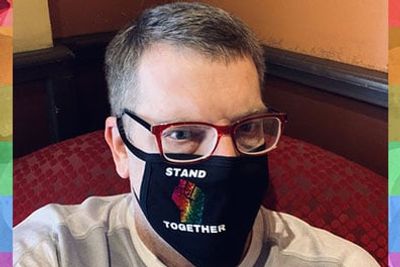By Buddy Early, August 2020 Issue.
There’s something that has been gnawing at me for the better part of a decade. You see, in the early 2000s I served as “the voice” of this magazine, Through 2007, in fact. As such, I wrote each issue’s editorial, speaking out for or against issues of concern to our community. Often, I was asked to speak on behalf of our community on local radio or television, or be quoted in another publication. It was a strange burden on these rare occasions to be asked to be “the voice” of the LGBTQ community, especially when there were a number of other people more qualified, but I tried my best.
Even in 2020, I stand by every interview I gave, and every editorial I wrote. Except one. It was on the topic of abortion. Now, I’ve been pro-choice since the late 1980s — after I stopped trying to ingratiate myself with a young Republican gal and I ultimately came to my senses on a number of topics. Nonetheless, I wrote that this magazine would not be taking a side in the pro-choice v. pro-life debate. My argument was that the magazine existed to further the cause of equality for our community, and taking sides in fights that didn’t belong to us would muddy the waters. There were quite a few members of our community, and Echo Magazine readers (natch!), who believed abortion was murder; we owed it to that minority to stick to our singular mission.
The thing is, there was no push-back on this from our readership. With the exception of a small faction of our community pressing for a broadening of the fight, staying laser-focused was generally the prevailing objective at the time. (For the record, I now refer to that small faction as visionaries.)
In the 15+ years since that column appeared, I have come around. The community has come around. We have realized that the fight is bigger than us, bigger than LGBTQ equality. The fight is for the equal rights of all Americans, for the human rights of all world citizens. We have started to embrace a concept known as intersectionality.
I will admit that when I first heard of intersectionality I assumed it was one of those terms I would come to loathe, like privilege, cultural appropriation, toxic, and problematic. Not that there is inherently anything wrong with these well-meaning terms, but they’ve been hijacked to explain away anything that one might not agree with. Nonetheless, intersectionality, like all those other terms, comes from a good place. In fact, I have yet to witness it used in a way that undercuts its own movement.
At the risk of this coming across like the opening of a junior high essay, I’ll just share the dictionary definition of intersectionality: “the interconnected nature of social categorizations such as race, class, and gender as they apply to a given individual or group, regarded as creating overlapping and interdependent systems of discrimination or disadvantage.”
I mean, it doesn’t get any clearer than that, right?
So, how have I altered my approach to social justice since being introduced to the concept of intersectionality? I started using my voice to advocate for the rights of women to control their own bodies; to be able to dress and act how they please without being harassed or assaulted; to earn the same salaries and have the same opportunities as male counterparts. I’ve been using my voice to shout about police brutality of black Americans and against the overt and casual racism that happens every day. And I use my voice to plead for fair and humane treatment of trans people, immigrants, and the poor.
To be blunt, any LGBTQ person who is not operating with an awareness of intersectionality is not 100 percent committed to the ideals of equality. During recent uprisings incited by the murder of George Floyd, I have definitely been taking notice of my peers who have been silent about the rights of black Americans to not be beaten up, shot, or killed by police. How can we expect to have the allies we need, the allies who will fight for our rights, if we are not willing to be allies ourselves?
In 2020, it doesn’t take a lot of time or money to use your voice. You don’t have to have a magazine provide you with space once a month so you can pontificate on the ills of our society. You don’t need to hold an elective office to spread your message to the general community. You don’t need to run a company or non-profit organization to effect change. All you need is that social media account.
Get your message out there. Stand up for equality and change. Not just for your right to marry and not be discriminated against, but for the other communities that are often in crisis. Let’s be allies to our allies.
